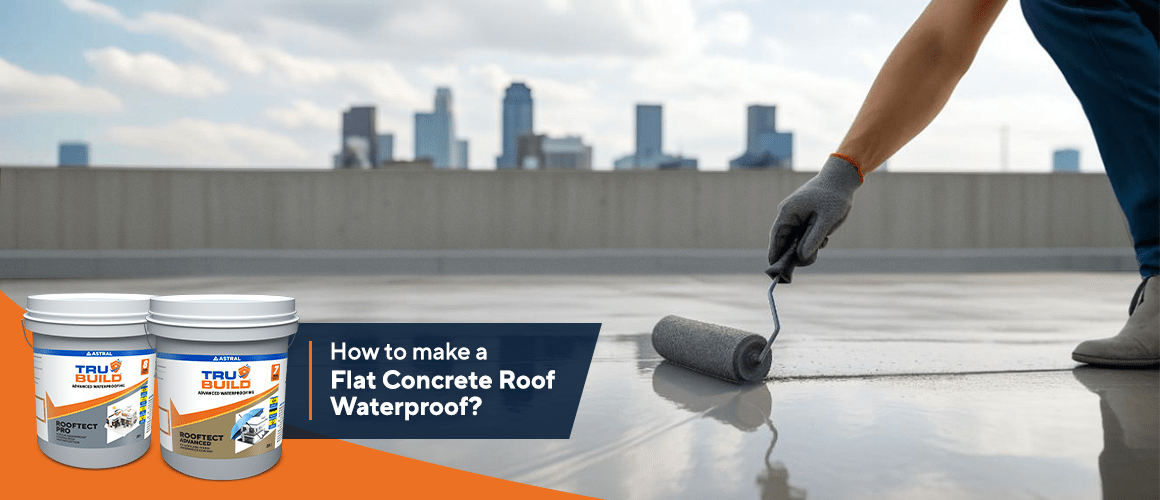How to Waterproof a Flat Concrete Roof?
Follow these steps for effective concrete roof waterproof application to protect your roof from leaks, cracks, and long-term weather damage.

Oct 21, 2025

Flat concrete roofs are common in many Indian homes and buildings, admired for their modern design and practical use of space. However, without proper concrete roof waterproof solutions, they can face issues during monsoons and hot summers. Water accumulation on flat surfaces often leads to leaks, damp patches, and cracks, highlighting the need for lasting roof protection. The right concrete roof waterproofing solution can prevent these issues. It helps to protect your property and gives you peace of mind through changing weather. This blog will guide you through simple, practical steps for flat roof waterproofing.
Moreover, roof edges and joints are vulnerable zones where leaks often start. Without a proper flat roof waterproof solution applied to the surface, moisture seeps into the concrete. This affects the underlying structure and causes long-term damage. A properly applied waterproofing solution, like a protective membrane or coating, acts as a shield. It makes flat roofs durable and resilient against heavy monsoon rains and harsh sun rays.
Even a flat roof needs a slight slope, ideally between 1 to 2 percent, to help drain water efficiently. This can be done by applying a thin layer of screed or adjusting the roof surface during construction or renovation. Without these measures, waterproofing alone may not last long.
Start by cleaning the roof thoroughly. Remove/clean dust, dirt, algae and any loose materials. Next, inspect the roof carefully for any cracks or damaged patches. Make sure to use a suitable repair mortar or crack filler to seal these areas. It helps to create a strong base for the flat roof waterproofing layers.
Choose a suitable, high-quality concrete roof waterproofing coating specially suitable for concrete roofs, such as Astral Trubuild Rooftect Advanced. Once cured, it creates a seamless film that is strong. This barrier is also resistant to weather and provides excellent waterproof protection. Use a brush or roller to apply the first coat evenly across the entire surface of the roof. Apply this coat in one consistent direction, for example, horizontally across the surface. This layer is very important because it lays the foundation for waterproof protection and it also prevents initial water ingress.
Corners, joints, parapet walls and edges need extra attention as they are prone to leaks. Apply reinforcement mesh or tape embedded in the waterproof coating on these spots to strengthen the system. This reinforcement prevents cracks from opening further. It also blocks water entry this is why it is especially important around roof drains and wall intersections.
Once the first coat dries, apply the second and final coat of waterproof coating. Apply this in the opposite direction to the first coat, for example, vertically if the first was horizontal. This cross-directional application ensures complete coverage, eliminates missed spots, and improves bonding between layers.
This layer adds thickness and durability, creating a tough outer shield against water, UV rays and weathering. The finish should be smooth and continuous leaving no gaps. Some products also provide reflective properties that help to reduce heat absorption along with keeping your roof cooler.
We have a range of solutions for old roofs and new roofs. Along with waterproofing solutions for roofs we also provide crack fillers, primers, sealers and base coats and top coats designed for roof surfaces. These products can be applied easily. For the best results, consult with Astral Trubuild experts or our authorised dealers to pick the right solution for your roof’s condition and needs.
Waterproofing a flat concrete roof is an essential step to stop leaks and extend the life of your property. Follow the proper steps of concrete roof waterproofing, to protect your roof through all seasons. With trusted solutions from Astral Trubuild, you can shield your roof from water damage. Enjoy a dry and comfortable home year-round, once you have opted for flat roof waterproofing.
Yes. Waterproof coatings create a strong barrier that stops rainwater from seeping through. This prevents leaks even during intense monsoons.
A good quality waterproofing system can last between 7 to 10 years depending on its material quality, installation and maintenance.
Cementitious coatings harden to form strong protection suited for concrete surfaces. Liquid-applied coatings remain flexible. They are ideal for areas with movement or temperature variations.